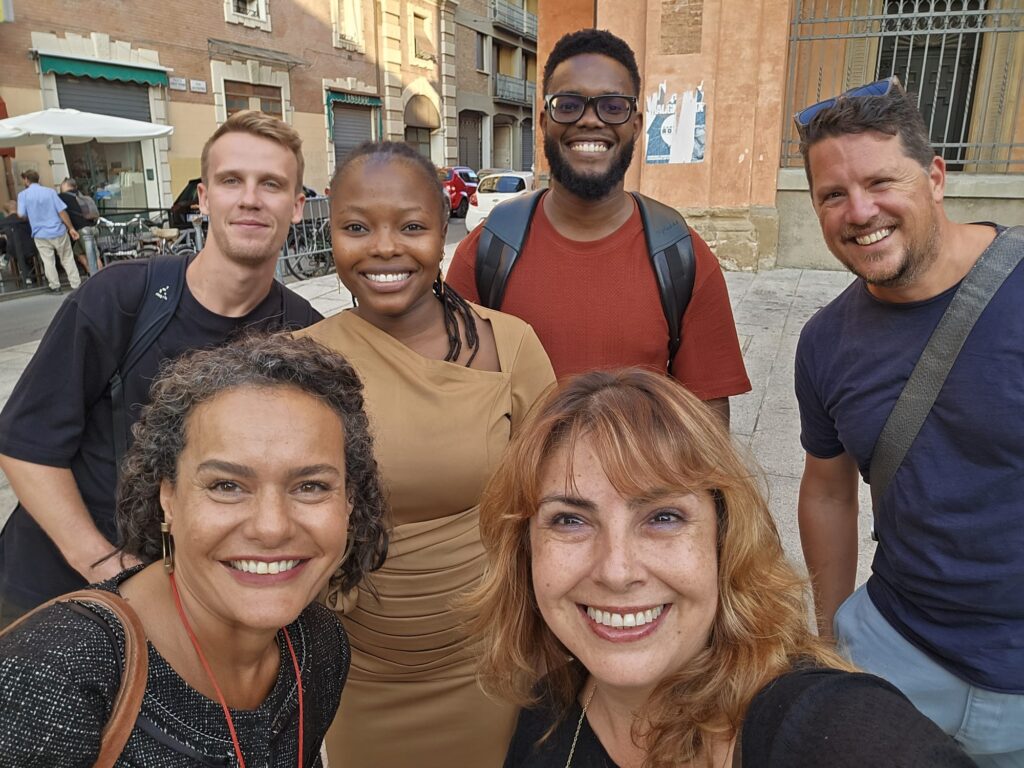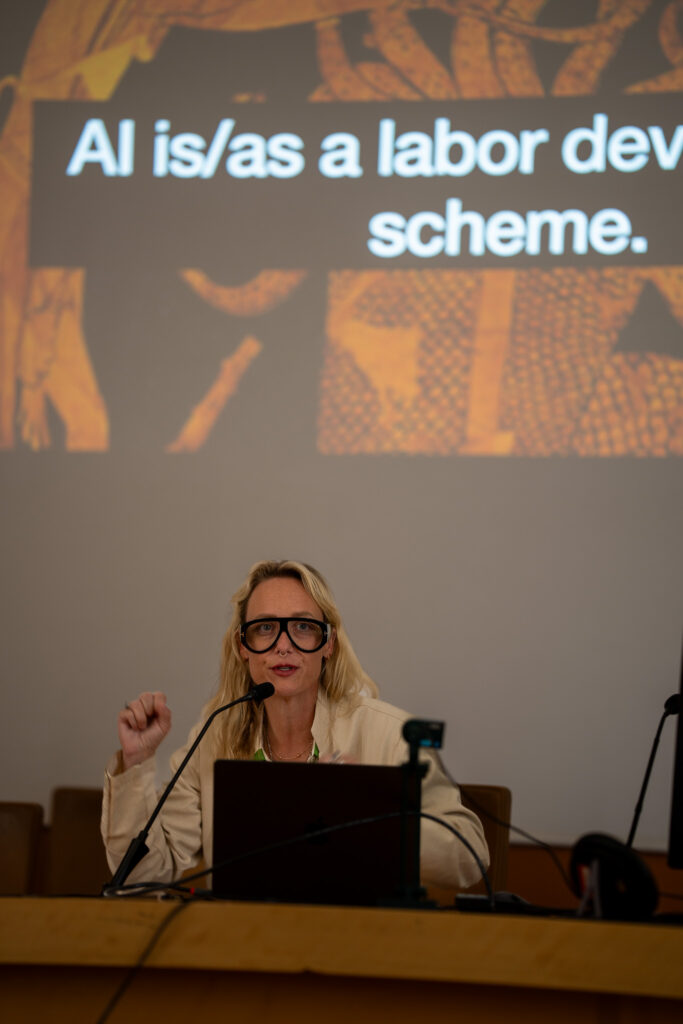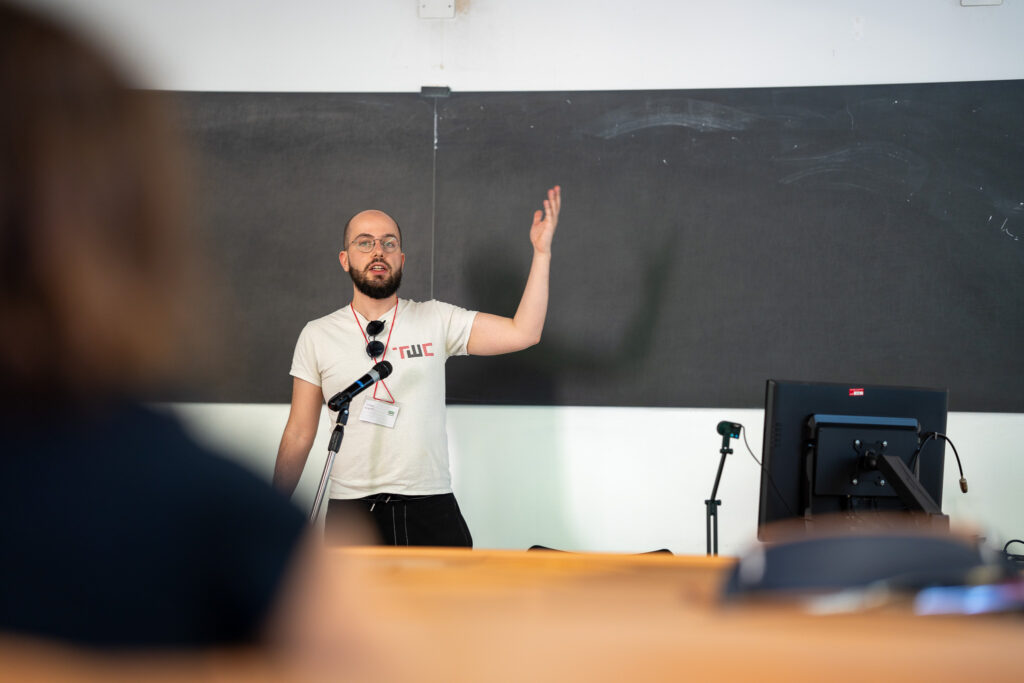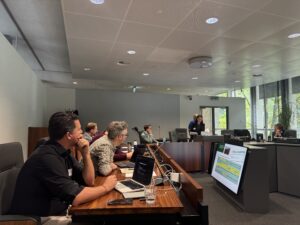Last week, the 8th conference of the ‘International Network of Digital Labor’ took place in Bologna. This network’s mission is to research and discuss aspects of work in the digital age. I traveled to Bologna by train to attend the conference and present my research on GigCV and data portability for platform workers, which I am conducting at the Amsterdam University of Applied Sciences. During the conference, there was a lot of talk about data work(ers), the gig economy, and a broader discussion about the impact of technology on work. In this blog, I share my insights and thoughts. In my story, I choose to focus on data work and the labor behind AI. Because this issue brings together all the challenges of an imbalance of power in the world of technology, especially from the perspective of the “Big Tech” platforms and mentality.
Technology has a growing impact on how we find, perform, distribute, control, evaluate, and value work. Not only at the individual level or within the silo of an organization, but also from a geopolitical perspective. The impact on individual workers is often discussed in the (on-site and online) gig economy, but is also clearly visible in the (digital) workplace. In recent years, the development of—and discussion about—AI has been added to this. AI is not a separate silo, but a technological development within the automation of work. And it always takes place within a specific context.
How platforms are fragmenting markets
The platform model works well in fragmented markets where the costs for different stakeholders (often: supply and demand) to find each other are high. In short: markets with a high degree of information asymmetry. The promise of platforms is that, as a ‘digital message board’, they will bring clarity to markets such as (social) media, e-commerce, the sharing economy, or the labour market. As the center of the network, they have an overview and, via digital technology, they can facilitate the matching of stakeholders, create trust, and execute transactions.
The paragraph above is how I used to view this, but nowadays I am more critical. Or perhaps I should say: more realistic. I am still convinced that platforms operate in fragmented markets, but I see an important nuance in that platforms have an interest in these markets becoming and remaining more fragmented and in the number of competitors with an equal information position being as small as possible.
In the beginning, Uber broke down local taxi markets by selling services below the price of cost and being “creative/selective” in interpreting regulations. Not only to ‘capture’ market share, but also to fragment the supply in the local market and thereby strengthen its own position. A new interpretation of “divide and conquer.”

Looking back on the past 20 years, social media platforms have also fragmented the ‘market’ for social contact and the business-to-consumer market by first facilitating users with the platform and then reducing the possibilities of owning your own network. For example, my business network has slowly but surely become dependent on my contact list on LinkedIn, but the function to export this list (including contact details) suddenly disappeared. Projects or jobs are also broken down into tasks. Sometimes this is much more efficient, but it is also a way of increasing the information position and thus the company’s interests. Finally, consider platforms such as Booking, which do everything they can to maintain information asymmetry and make use of data on demand (reviews) and supply (advertisements).
In addition to local and national fragmentation, international fragmentation is also being exploited. Or perhaps better said: the use of institutional fragmentation. International regulations are absent, allowing platform and technology companies not only to pit countries and continents against each other, but also to “shop” for countries that do not ask too many questions or that have a poorly developed institutional landscape.
The result is a growing concentration of power, the increasing externalization of risks and costs to individuals and society, and increased dependence (and decreased sovereignty).
Data work
One field in which fragmentation is evident in all the areas mentioned is data work. This is the work that forms the basis of the AI we all use. Think of annotation, moderation, checking, and updating. This is a topic that came up frequently during the conference and one that I have been working on a lot lately, as you can read and listen to in the latest podcasts I made for the WageIndicator Foundation.
During the conference, the documentary “In The Belly of AI” was shown, which paints a dystopian picture of the conditions under which at least 150,000,000 data workers have to do their work. Not as an unfortunate side effect, but as a deliberate strategy.
In Bologna, several data workers were presenting, and I spoke to some of them. Their stories are intense. People who are so changed by their work that those around them no longer recognize them. They are regularly diagnosed with PTSD, and even years after they have stopped doing this work, they still have symptoms such as insomnia, nightmares, and impaired short-term memory.

Colonial structures and concentration of power: from Big Tobacco to Big Tech
The second day took place at DAMA, where the site of a former tobacco factory now houses an ecosystem of initiatives related to AI and data. A public initiative. Although DAMA is a public initiative, the fact that it is located in a former tobacco factory is an interesting choice. You could say that both sectors, tobacco and Big Tech, have many similarities. Think of having a powerful lobby, a prime example of ‘using’ colonial structures (read: exploitation) and externalizing costs and risks to the individual and society.
The dilemma is that the impact of the tobacco industry is essentially bad and should be minimized, whereas AI, if used under the right conditions, also has many positive aspects. I would like to note, however, that if a fair price were paid for AI, many services such as ChatGPT would be available to far fewer people or, at the very least, would be used much more consciously. Which in itself would not be a bad thing. In addition, discouraging smoking through policy and individual efforts is easier than stopping AI. I am therefore not in favor of stopping AI, but I am in favor of AI that does not adopt and reinforce existing power structures. Perhaps it is naive to believe that things can be different, but ultimately everything is a choice, and making choices involves taking responsibility.
AI: good for whom?
AI gives more people access to more opportunities. More people, but by no means all people. Sarah Roberts, professor at UCLA (University of California) and author of the book ‘Behind the Screen: Content Moderation in the Shadows of Social Media’, has a clear opinion about who AI is really good for. In her presentation, she called AI a ‘systematic mechanism for labor devaluation’. She asked the (legitimate) question: who benefits from AI? Of course, individual users reap the rewards of AI, even though they are now, in a sense, data workers, training a system that skims off the value.

To know who the real winner is, it is important to look at where the profits made with AI go. For example, AI allows workers to work more efficiently, but this will generally lead to an employer or client demanding more work from the worker in the same amount of time. This can be seen, for example, at translation agencies, but also in distribution centers, as can be read in the “Fairwork Amazon Report 2024: Transformation of the Warehouse Sector through AI.” This does not only apply to low-valued and low-paid precarious work. Because let’s be honest: would your boss allow you to spend the time you save by being more productive on vacation days for the same salary?
Regardless of where the “gains” go, you can also question the mantra that productivity gains (which many see as an exaggerated promise, with some exceptions) lead to more free time. I have come across the idea that technological change does not generally contribute to less work, historically speaking, in two books I am currently reading: ‘More Work for Mother: The Ironies of Household Technologies From the Open Hearth to the Microwave’ by Ruth Schwartz Cowan and ‘Waiting for Robots, The Hired Hands of Automation’ by Antonio Casilli.
Solutions
As I wrote earlier, I am not opposed to AI or technology. I too see the possibilities that exist and enjoy the benefits of these developments every day. What I am opposed to is the inequality that is increasing as a result of technology, the impact of these large companies on the debate and policy, and the way in which costs and risks are externalized and profits are privatized (at all costs).
Where are the solutions? Although there is no “golden bullet” that can fix everything, I believe it starts with acknowledging and recognizing the situation. Looking beyond the industry’s rhetoric and asking critical questions. To begin with, there is a lot of talk about the impact of technology. In my opinion, it should be less about the technology and more about the underlying choices, ownership, and governance structures. Technology in itself does nothing; it is the choices made by the stakeholders involved that determine its effects. The advantage of this perspective is that you can no longer hide behind ‘not being able to understand’ systems because they are too complex. The system should never take center stage, and everyone, every stakeholder, is jointly responsible.
It is also important to recognize that tech companies are businesses, not countries with democratically elected representatives. So please stop talking about democratization, because giving a few more people access while simultaneously strengthening your own unelected power has little to do with democracy. In any case, I invite you to be more critical of the words used in the discussion. Be sharper, be more critical.
Back to data workers: where are the solutions here? The advantage of the market behind data work compared to the broader gig economy market is that the buyers of data work are almost always companies, while buyers in the gig economy are almost always consumers. The advantage of companies is that it is easier to address them and hold them accountable for the choices they make. In the clothing industry, exploitation in the production chain is being combated, and this can also be done in the AI supply chain. And again: the exploitation of data workers is not an incidental coincidence, but a very conscious choice. A choice made by companies valued at many billions of euros.
In a market that revolves around fragmentation, organization is the final solution I would like to point to. I have previously researched this in relation to the cooperative model (platform cooperatives), and I also see promising initiatives in the data work sector, such as the Data Labelers Association, Turkopticon, and the Worker Info Exchange.
Many initiatives are bottom-up, and trade unions, whose core focus is on organizing workers and thereby reducing the power imbalance, are, in my opinion, still not looking enough at how they can support these workers with creative tools. For example, in Bologna, I attended a presentation by ‘Reversing.works’, which uses workers to investigate what data the worker’s platform stores, uses, and sells.

To conclude
I have said a lot in this blog, and it was sometimes challenging to keep it structured. I hope you can forgive me for that. The conference in Bologna was the trigger for writing this piece, which brings together a lot of the thinking I have done over the past few months and years.
If there is one thing I hope you will remember after reading this blog, it are three words: together, choices, and power. Together: I see too many silos in the debate, each with their own agenda and their own language, without much interest in delving into the other side. That is a shame: the only way to work towards a sustainable solution is by working together with all stakeholders. To understand why the other person does what they do. Just because you may not be able to identify with another stakeholder does not mean you should close the door. My tactic is to try not to get annoyed, but to be curious. That has helped me a lot. By being curious, however difficult it may sometimes be, you remain open-minded and keep the door open.
Choices to emphasize that everything we do is the result of decisions that are made. And decisions can be influenced. When you are aware that choices can and must be made, you are also aware of your responsibility in this regard. And finally: power. Ultimately, it is important to look beyond all the beautiful stories and cool tools and see what a development contributes to gaining or losing power. By simply asking the question: why does someone say what they say and who wins when this becomes reality? Which boils down to the advice to remain critical, without becoming bitter. A daunting task in this day and age, but nothing is impossible.






